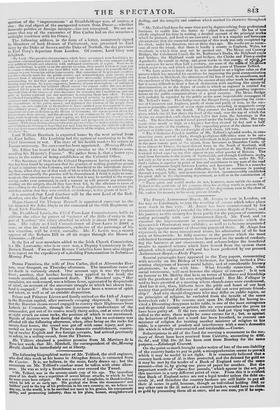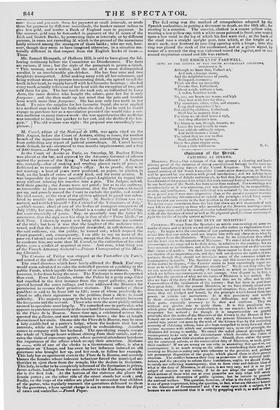The French Astronomer-Royal, M. rag°, is now in London, on
his way to Edinburgh, to join the meeting of means which takes place next week in that city. 31. A rago has been coinmissioned by his iovernment to entirely remodel the Ob.4crv;dDire- Royale at Paris; and his journey to this country has been partly for the purpose of communi- cating personally with our Astronomer-Royal, Mr. Pond, and to examine the improvements in astronomical instruments which the Greenwich Observatory now exhibits ; as well as to become acquainted with the superior manner of observing practised there. M. A rago has expressed, in the most unequivocal terms, his admiration of all he has seen at Greenwich : he fully concurs in the praises which the most celebrated German astronomers have bestowed on the mode of conduct- ing the business at our observatory, and acknowledges the beneficial results to nautical science which have flowed from the system there adopted, which originated with and has been perfected by our present Astronomer-Royal.—Doily Papers.
Several paragraphs have appeared in the Tory papers, commenting with severity on the Bishop of Chichester, for having invited a Die- senting clergyman of known moral habits, and of considerable literary attainments, to dine with him. What friendly connexion, what social intercourse, will next become the object of censure ? Is it not an honour to Dr. Maltby that he is on terms of kindness and friendship with the gentlemen of his own neighbourhood? But Mr. Fullagar is said to have presided at a meeting where church-rates were condemned. And has it not, then, hitherto been the pride and boast of our best society that political difference of opinion did not sever private friend- ship ? And why should clergymen who may differ on public topics, or on principles of religion, be excluded from the benefit of the same benevolent rule ? The censure cast upon Dr. Maltby for having in- vited a Dissenting clergyman to his table, is one of the most outrageous and disgraceful inroads on private life we ever remember the press to have been guilty of. If the two convivials had got tipsy together, or rolled in the mire, there might be some excuse for it ; but, as against the behaviour of both not a word has been breathed, to censure one minister of religion for inviting another minister of religion to his table, is a species of prudery and interference with a man's domestic life which is wholly unwarranted and intolerable.—Courier.
Subscriptions in aid of the fund for erecting a monument to the me- mory of Scott have been received from Calcutta, amounting to 493/. Os. 8d., and 1311. 188. 2d. has been sent from Bombay for the same purpose.—Edinburgh Courant.
On the point so much brought under notice of late of the non-liability of the country banks to pay in gold, a misapprehension seems to preyed
which it may be useful to set right. It is commonly believed that a country bank-note of Y. is thus protected, and the demand for gold en it may be met by the tender of a Bank of England note of the same amount—that is, by giving one piece of paper for another. But the important words of y" above five pounds," which appear in the act, put this question in a very different point of view. From this it is evident
that Bank of England notes are not a legal tender unless the debt ex-
ceeds 5/., and therefore the country bankers are still liable to pay all their W. notes in gold, because, though an individual holding 1001. or any other sum in the 51. notes of a country banker, would have no claim to gold by presenting them all at. once, and as one sum, yet if he sepa-
rate• tlatu and pre-cuts them for payment at small intervals, or sends them for peyment by different individuate, the bunker cannot refuse to we him gold, and tender a Back of England note in payment. In like manner, gold may be demanded in payment of the 11. notes of the Irish and Scotch Banks, by presenting them at intervals, or by different persons, in sums not exceeding 5/. which is the ground of the uneasiness lately evinced among the managers of those banks ; who are not, how- ever, though they seem to have imagined otherwise, in a situation ma- terially different in that respect from the English banks of issue.— Times.
Mr. Samuel Herapath, of Holborn Hill, is said to have given the fol. lowing testimony before the Committee on Drunkenness. The facts are curious, if true ; but the style of the paragraph is penny-a-linish. " This woman, now a widow, and the aunt of a most distinguished vocalist, is an irreclaimable gin-drinker. She has four sons and two daughters transported. After making away with all her substance, and being without means to procure intoxicating drink, she agreed to sell the teeth in her head, to supply herself with her favourite beverage : she had every tooth actually taken out of her head with the exception of two, and sold them for gin. The last tooth she took out, an individual in Long Acre, the same dentist who bought the others, gave her for it only fourpence ; and she then made up her mind that the pain and trouble were worth more than fburpence. She has now only two teeth in her Lead. To raise the supplies for her favourite liquid, she next applied to a medical man to take her body when she died ; but he said he would engage to purchase her as a speculation provided. shy would take a cer- tain medicine so many times a week : she was apprehensive the medicine was intended to bring her quicker to her end, and she declined the bar- gain." 1The old woman was right : the proposal was exceedingly sus- picious.]

















 Previous page
Previous page